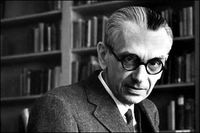 I'm reading Rebecca Goldstein's book 'Incompleteness' right now. It's both a partial explanation of Godel's Incompleteness Theorem and a partial biography of the man himself. I've just started the book but I can already tell it will be good. I have a profound fascination with Godel. Perhaps more so than Einstein. He's kind of like Heisenberg. He has always been more of a mystery and unknown than Einstein. Einstein's fame has made him familiar and in a way lessened his genius. Heisenberg was perhaps a little better known but only because the Uncertainty Principle is used as an analogy so often. His life is relatively unknown. Did you know he worked for the Nazis heading up their 'Manhattan Project' (although it's unclear how committed he was to Nazi ideals or lack thereof).
I'm reading Rebecca Goldstein's book 'Incompleteness' right now. It's both a partial explanation of Godel's Incompleteness Theorem and a partial biography of the man himself. I've just started the book but I can already tell it will be good. I have a profound fascination with Godel. Perhaps more so than Einstein. He's kind of like Heisenberg. He has always been more of a mystery and unknown than Einstein. Einstein's fame has made him familiar and in a way lessened his genius. Heisenberg was perhaps a little better known but only because the Uncertainty Principle is used as an analogy so often. His life is relatively unknown. Did you know he worked for the Nazis heading up their 'Manhattan Project' (although it's unclear how committed he was to Nazi ideals or lack thereof).Godel is clearly not as famous. Most people are only familiar with his work through Hofstadter's work "Godel, Escher, & Bach". But his theorem is on par with those of both men in terms of the shock waves created, that seemed to ripple out to other fields due to the sheer oddness of what they were saying. Einstein - time and space are not quite what you think they are, Heisenberg - nothing is quite what you think it is, and Godel - everything is questionable.
Godel's work is hard to put into a single sentence. Hofstadter does a good job. But I've read that book 3 times now and I will undoubtedly read it again after I'm done with this book. In many ways Godel's work is more revolutionary. Simply because it is mathematics. What he has shown stands. Period. Einstein's and Heisenberg's work could for all we know be largely forgotten in 1,000 years. Godel's will stand. Ozymandias he is not.
But I don't want to linger on his theorem. Two comments. First, check out his picture above. Is this not the most striking, stereotypical scientist face you've ever seen? That shock of black hair combed back with his grey. I had no idea he was such an intense looking man. It's hardly surprising though given the intensity it must take to create mathematics like his. If mathematics didn't work out he certainly had a role in the Munsters available to him.
Second, he became a little certifiable after his work. This is not surprising. This seems par for the course. I recall a mathematician (but not his name) who proved 1 + 1 = 2. Where does one even start with that proof? My recollection of the story was that this man went crazy afterwards and never turned out another piece of research. That could be a bit overblown but it does seem like great scientists and mathematicians either put out good work in their 20's/30's or put out one major piece of work that literally blows a gasket. After his theorem, Godel suffered from a nervous breakdown, depression, entered a sanatorium, and was treated by a psychiatrist. A mentor of his was killed by a young socialist and he suffered another breakdown. He eventually moved to the US and became a citizen working at the Institute of Advanced Study (also affectionately called Einstein's Institute by some).
While it seems Einstein had some calming effect on Godel he slowly spiraled down. He had some health problems but had a distrust for doctors. In fact it seems he perhaps was a hypochondriac. His approach to solving this was through his diet but his diet was fairly radical. Eventually he became paranoid and thought people were trying to poison him. Amazingly he didn't eat. And that's how he died. He starved to death.

2 comments:
Came to your blog through your primer post appearing on search results in technorati, I just loved your posts on primer as well as Godel.
I havealso been fascinated by
Godel a lot.
I must say that I don't fully comprehend it but when ever I get some time to kill, I sit and try to know more about it and understand godel's work better.
It is wonderful that you put these posts on Godel.
Rajan
Glad it was helpful. If you have questions post them here and I'll try to answer. I'm with you. There's some parts of Godel that I'm not completely comfortable with.
"Godel, Escher, and Bach" by Hofstadter is a great read for understanding Godel. But "Incompleteness" is the best book so far and the one I used to take notes with. I recommend that for an easier read on his Incompleteness Theorem. Part 4 on my posts is the key one to understand. The prior posts are build up to that post. And the later ones are a little more detail on how he 'wrote' his theorem using arithmetic.
Post a Comment